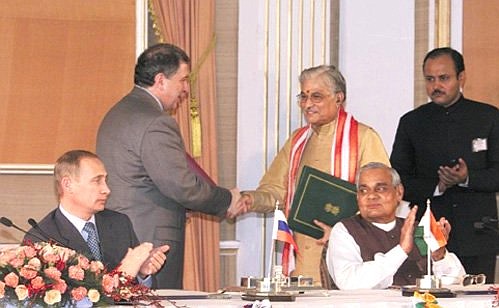Mr Putin and Mr Vajpayee first met one-on-one at the Hyderabad Palace and were then joined by their delegations.
The two leaders spoke in support of working together to build a democratic world order and strengthen international security.
Other subjects discussed included reform of the United Nations, the situation in South Asia and coordination of work to combat international terrorism.
Mr Putin and Mr Vajpayee also declared their intention to expand bilateral cooperation in all areas, including economic, scientific and military-technical cooperation.
The two leaders concluded their talks by signing a Joint Russian-Indian Declaration and a Declaration on Strategic Partnership between the Russian Federation and India.
Russian and Indian state ministries and agencies also signed a number of bilateral agreements: a comprehensive long-term science and technology cooperation programme for 2001–2010; an agreement on agriculture sector cooperation; an agreement on legal assistance and legal relations in civil and trade matters; an agreement on cooperation between postal services; a bilateral exchange programme in the areas of cultural, science and education; a production-sharing agreement for the project to explore and develop block 26 in the Bay of Bengal; and an intergovernmental agreement on mutual protection of the confidentiality of documents.
Also signed were a memorandum on cooperation between the Russian and Indian Justice Ministries; an intergovernmental agreement on principles of cooperation between the executive bodies in the Russian regions and the local government authorities in India’s states and union territories; and a protocol of intent on cooperation in diamond processing and the trade in rough diamonds and precious metals.
Mr Putin and Mr Vajpayee held a joint press conference following their talks.

